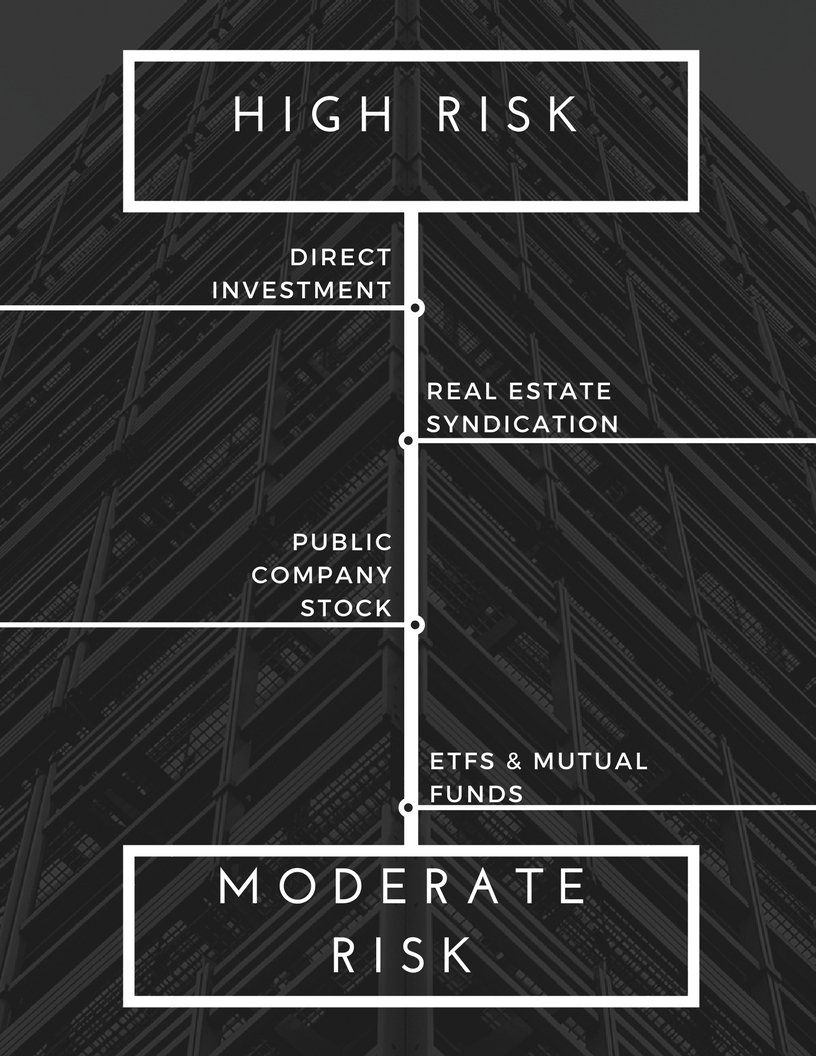Best Ways to Invest in Real Estate
By Frank Uhler

Given the importance of the real estate industry to our country’s economic growth, it would be wise for the diversified investor to consider gaining exposure to this market through personal investments. The real estate market is a significant segment of the economy, and according to the National Association of Home Builders, generally averages a 15-18% contribution to the U.S. GDP. As an investor, there are several different ways to gain exposure to the real estate market. Each of these investment vehicles varies in the amount of risk and return. They also differ in the minimum amount of capital necessary to make an investment.
It’s important for individual investors to consider their risk tolerance, investment horizon, and savings goals when considering which type of real estate investment might be right for them. Below I provided some brief insights into the different ways individuals can invest in the real estate market to help identify which type of investment best fits within your wealth management goals.
Direct Investing
Direct investing involves the purchase of property by an investor. It requires the most up front capital, and is also a higher risk investment. This form of investing is often done by experienced real estate professionals due to the time requirements of identifying strong opportunities, obtaining financing, active property management, and construction.
As a property owner, you are responsible for managing all aspects of the property and are also entitled to all the income generated through rents. Non-real estate professionals who invest directly in real estate often use third party property managers to help with the active property management requirements. One alternative to hiring a property manager is using a property management software such as Rentalutions. This software provides an effective and lower cost alternative to hiring a property manager for the individual investor.
When done effectively, investing directly by purchasing your own property can be a great tool for generating passive income and building wealth.
Real Estate Syndication
You can also invest directly into real estate as a passive investor through a process called real estate syndication. This process involves the aggregation of investor capital by a real estate company (syndicator) for the purpose of investing directly into real estate opportunities. The real estate companies manage all aspects of the direct investment process (identify the investment opportunities, raise the necessary capital, obtain financing, construction management, and property management). Honore Properties is a real estate syndicator.
This type of investing can provide investors with solid returns and does not require any active participation in the process. However, the risk is higher because it is still concentrated on the performance of individual properties.

Exchange Traded Funds (ETFs) and Real Estate Mutual Funds
Real Estate ETFs or mutual funds provide investors with the opportunity to diversify their investment into a variety real estate related companies. These funds can have a variety of strategies including a focus on specific types of real estate (retail, residential, office, muti-family) or geographic regions. These funds primarily invest in real estate related stocks, but some include direct purchases of real estate assets.
The main advantage of these types of investments is diversification. The purchase of one ETF or mutual fund is an investment into all of the underlying real estate company stocks or real estate assets held by that fund. This can be beneficial to those with less investment capital, who lack the ability to diversify into several different investments. Furthermore, many of these funds have low minimum investment thresholds.
Personally, I prefer ETFs to mutual funds because they generally have lower expenses and are easier to trade through online brokerages.
Public Company Stock
REITS
One type of real estate stock investment is known as a real estate investment trust (REIT). REITS are public companies that own and manage real estate and mortgages. They are a popular form of real estate investment because of the dividends paid to investors. In order to retain status as a REIT (and the tax benefits that come along with it), these companies must distribute 90% of their taxable income to shareholders in the form of a dividend. This generally results in higher dividends for investors in REITS when compared to your average S&P 500 company. According to NAREIT, as of April 2017 the average dividend for REITS was 4.14% versus 2.01% for companies in the S&P 500.
REITS also allow investors to participate in the income produced by real estate investments through the purchase of a stock, without having to identify and purchase an actual property. These REIT stocks are more liquid than traditional real estate and can easily be bought and sold through stock exchanges.
REITS provide the benefit of diversification because they often own large portfolios of properties. The purchase of one particular REIT stock includes an interest in all the underlying properties held by that REIT.
Real Estate Company Stocks or Peripheral Business Stocks
There is also a variety of real estate company stocks available on the public exchanges which are not classified as REITs. The companies generally pay a lower dividend, but have more freedom to re-invest their profits. These types of companies may be in the business of owning, developing, and operating real estate assets, or they could be peripheral businesses.
Peripheral businesses may provide services to the real estate industry (brokerages, property managers, etc.) or businesses that benefit from an active real estate market (Home Depot, Sherwin Williams, etc.). These companies are not in the business of owning real estate assets, but benefit from home building and home improvement.
Individual investors have a variety of options when it comes to investing in real estate. Hopefully, the insights above can help you get started with an assortment of options that suites your investment strategy best.






